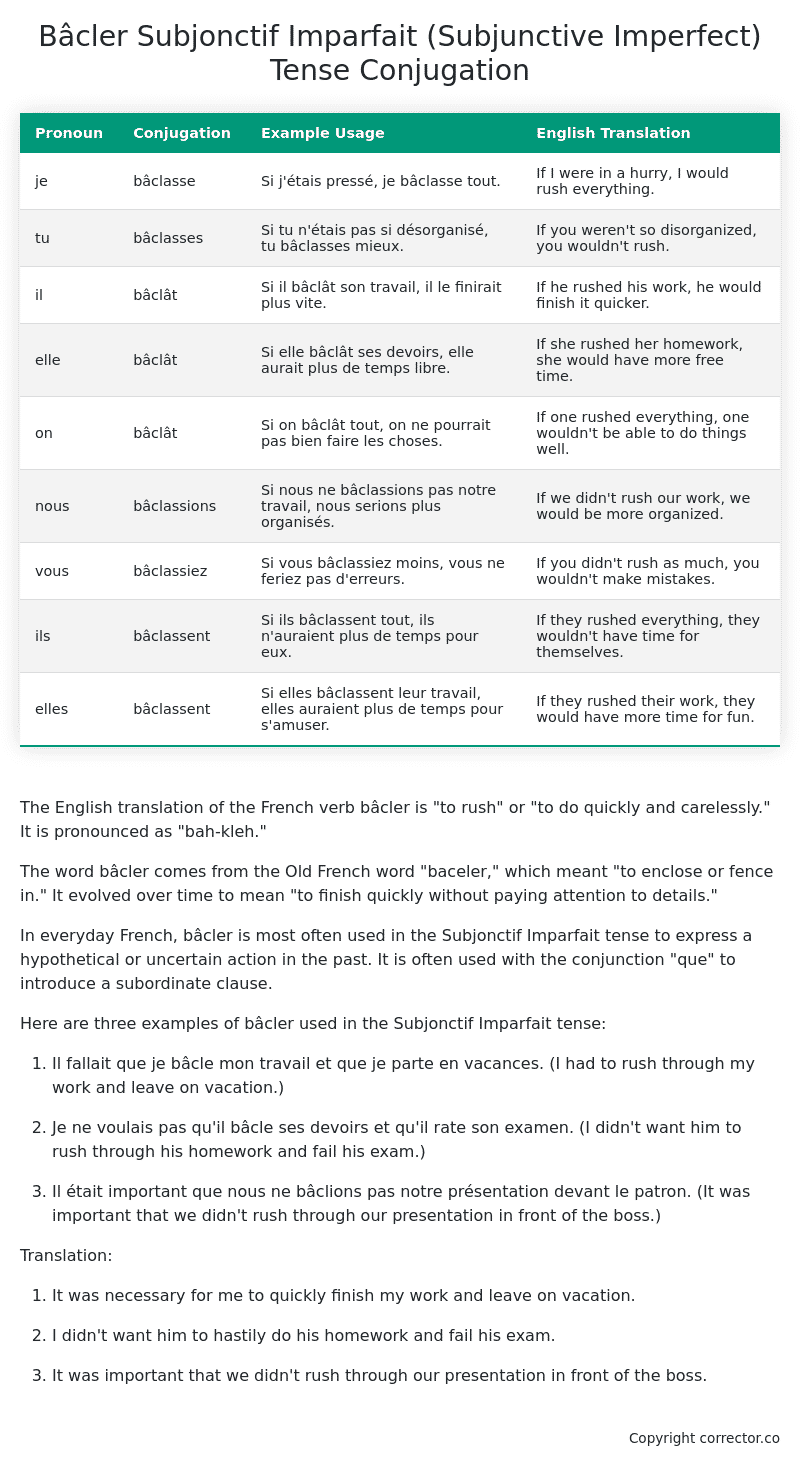Subjonctif Imparfait (Subjunctive Imperfect) Tense Conjugation of the French Verb bâcler
Introduction to the verb bâcler
The English translation of the French verb bâcler is “to rush” or “to do quickly and carelessly.” It is pronounced as “bah-kleh.”
The word bâcler comes from the Old French word “baceler,” which meant “to enclose or fence in.” It evolved over time to mean “to finish quickly without paying attention to details.”
In everyday French, bâcler is most often used in the Subjonctif Imparfait tense to express a hypothetical or uncertain action in the past. It is often used with the conjunction “que” to introduce a subordinate clause.
Here are three examples of bâcler used in the Subjonctif Imparfait tense:
-
Il fallait que je bâcle mon travail et que je parte en vacances. (I had to rush through my work and leave on vacation.)
-
Je ne voulais pas qu’il bâcle ses devoirs et qu’il rate son examen. (I didn’t want him to rush through his homework and fail his exam.)
-
Il était important que nous ne bâclions pas notre présentation devant le patron. (It was important that we didn’t rush through our presentation in front of the boss.)
Translation:
-
It was necessary for me to quickly finish my work and leave on vacation.
-
I didn’t want him to hastily do his homework and fail his exam.
-
It was important that we didn’t rush through our presentation in front of the boss.
Table of the Subjonctif Imparfait (Subjunctive Imperfect) Tense Conjugation of bâcler
| Pronoun | Conjugation | Example Usage | English Translation |
|---|---|---|---|
| je | bâclasse | Si j’étais pressé, je bâclasse tout. | If I were in a hurry, I would rush everything. |
| tu | bâclasses | Si tu n’étais pas si désorganisé, tu bâclasses mieux. | If you weren’t so disorganized, you wouldn’t rush. |
| il | bâclât | Si il bâclât son travail, il le finirait plus vite. | If he rushed his work, he would finish it quicker. |
| elle | bâclât | Si elle bâclât ses devoirs, elle aurait plus de temps libre. | If she rushed her homework, she would have more free time. |
| on | bâclât | Si on bâclât tout, on ne pourrait pas bien faire les choses. | If one rushed everything, one wouldn’t be able to do things well. |
| nous | bâclassions | Si nous ne bâclassions pas notre travail, nous serions plus organisés. | If we didn’t rush our work, we would be more organized. |
| vous | bâclassiez | Si vous bâclassiez moins, vous ne feriez pas d’erreurs. | If you didn’t rush as much, you wouldn’t make mistakes. |
| ils | bâclassent | Si ils bâclassent tout, ils n’auraient plus de temps pour eux. | If they rushed everything, they wouldn’t have time for themselves. |
| elles | bâclassent | Si elles bâclassent leur travail, elles auraient plus de temps pour s’amuser. | If they rushed their work, they would have more time for fun. |
Other Conjugations for Bâcler.
Le Present (Present Tense) Conjugation of the French Verb bâcler
Imparfait (Imperfect) Tense Conjugation of the French Verb bâcler
Passé Simple (Simple Past) Tense Conjugation of the French Verb bâcler
Passé Composé (Present Perfect) Tense Conjugation of the French Verb bâcler
Futur Simple (Simple Future) Tense Conjugation of the French Verb bâcler
Futur Proche (Near Future) Tense Conjugation of the French Verb bâcler
Plus-que-parfait (Pluperfect) Tense Conjugation of the French Verb bâcler
Passé Antérieur (Past Anterior) Tense Conjugation of the French Verb bâcler
Futur Antérieur (Future Anterior) Tense Conjugation of the French Verb bâcler
Subjonctif Présent (Subjunctive Present) Tense Conjugation of the French Verb bâcler
Subjonctif Passé (Subjunctive Past) Tense Conjugation of the French Verb bâcler
Subjonctif Imparfait (Subjunctive Imperfect) Tense Conjugation of the French Verb bâcler (this article)
Subjonctif Plus-que-parfait (Subjunctive Pluperfect) Tense Conjugation of the French Verb bâcler
Conditionnel Présent (Conditional Present) Tense Conjugation of the French Verb bâcler
Conditionnel Passé (Conditional Past) Tense Conjugation of the French Verb bâcler
L’impératif Présent (Imperative Present) Tense Conjugation of the French Verb bâcler
L’infinitif Présent (Infinitive Present) Tense Conjugation of the French Verb bâcler
Struggling with French verbs or the language in general? Why not use our free French Grammar Checker – no registration required!
Get a FREE Download Study Sheet of this Conjugation 🔥
Simply right click the image below, click “save image” and get your free reference for the bâcler Subjonctif Imparfait tense conjugation!

Bâcler – About the French Subjonctif Imparfait (Subjunctive Imperfect) Tense
Formation
Common Everyday Usage Patterns
Interactions with Other Tenses
Subjonctif Présent
Indicatif Passé Composé
Conditional
Conditional Perfect
Summary
I hope you enjoyed this article on the verb bâcler. Still in a learning mood? Check out another TOTALLY random French verb conjugation!


